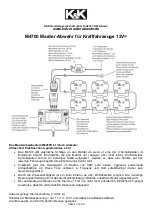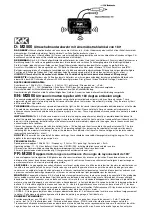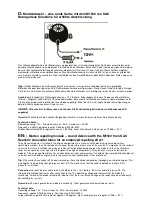
Accident data recorder (Event Data Recorder)
The vehicle is equipped with a device that serves as an accident data recorder
(referred to solely as “EDR” from this point). The main purpose of the EDR is
data recording during a traffic accident or other exceptional traffic conditions
(referred to solely as “accident” from this point), where the restraint systems
are activated.
The EDR records the accident in a short time (approximately 10 s), by showing
the following information, for example:
▶
The function of certain vehicle systems,
▶
The driver and passenger seat belt status,
▶
The actuation of the brake and accelerator pedal,
▶
The speed of the vehicle at the time of the accident.
The recorded data helps with the analysis of how the vehicle systems were be-
having shortly before, during and shortly after the accident, thereby ensuring
better information regarding the circumstances under which the accident oc-
curred, which lead to material damage and possibly to personal injury.
The data relating to assist systems in the vehicle is then also recorded. In addi-
tion to the information on whether the affected systems were switched on or
off at the relevant time, whether these were only partially available or were in-
active, there is also the possibility of tracking whether these vehicle functions
controlled, accelerated or braked the vehicle during the accident. Depending
on the vehicle equipment, these functions may include, for example:
▶
Adaptive Cruise Control (ACC)
▶
Lane Assist
▶
Park Assist
▶
Parking aid
▶
Emergency brake function (Front Assist)
EDR data is only recorded if an accident causes the restraint systems to be ac-
tivated. Under normal driving conditions there is no data recording and there is
no audio or video recording of the vehicle interior or the vehicle environment.
Personal data such as name, gender, age or place where the accident occurred
is also not stored in the EDR. However, third parties such as law enforcement
authorities may use certain resources to connect EDR content to other data
sources, and therefore deduce the identification of some of the people in-
volved in the accident when investigating the causes of the accident.
Reading out the EDR requires special equipment with specific access authori-
zation and a legally prescribed diagnostic connection in the vehicle “on-board
diagnostics”), and the ignition will need to be switched on.
ŠKODA AUTO will not read or otherwise process any accident data from the
EDRwithout the approval of the vehicle owner or other person authorised for
use of the vehicle. Exceptions are specified in the contractual arrangements, or
these are subject to generally binding regulations.
Due to the legal requirements, ŠKODA AUTO is required to monitor the quali-
ty and safety of its products, meaning that it is only entitled to use data from
the EDR for monitoring the product on the market, for further research and
development, and to improve the quality of the vehicle's safety systems. For
the purpose of research and development, ŠKODA AUTO will also make data
available to third parties. This is done exclusively in anonymous form, i.e. with-
out any connection to the specific vehicle, the vehicle owner or other author-
ised user.
8
Accident data recorder (Event Data Recorder)
Summary of Contents for KAROQ 2017
Page 1: ...OWNER S MANUAL Vehicle and Infotainment ŠKODA KAROQ ...
Page 37: ...35 Transporting children safely ...
Page 38: ...Fig 29 Cockpit example for LHD 36 Operation ...
Page 319: ...317 Index ...
Page 320: ...318 Index ...
Page 321: ...319 Index ...
Page 323: ......
Page 324: ...www skoda auto com Návod k obsluze Karoq anglicky 07 2017 57A012720AA 57A012720AA ...











































